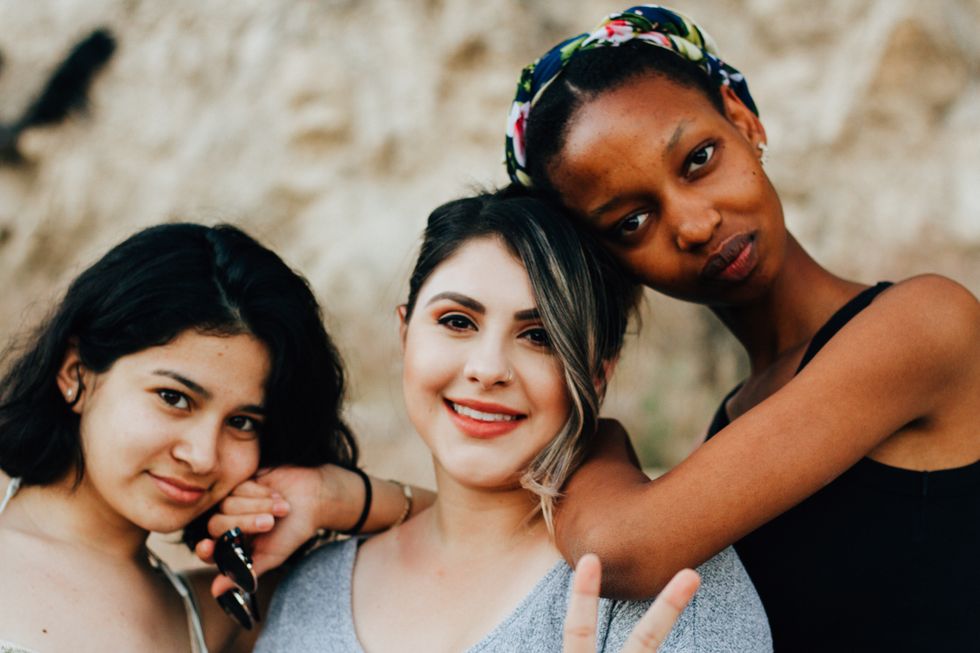As a Black women living in The United States, something that I have heard quite often from white people, in particular, is the phrase, “I don't see color." Connected to this phrase is the idea that if one just simply [white] washes away the history and culture of a colored person, that they can't be racist because now everyone is “equal." Except, we aren't all equal.
First of all, let's break down the term "colorblind." Anyone truly “colorblind" suffers from a condition known as Achromatopsia. Archomatopsia is a hereditary visual disorder due to an abnormality in the retina that affects about 1 in every 33,000 people worldwide. More common conditions are red-green colorblindness or blue-yellow colorblindness, where blues look green and yellows come off as pink or grey. This, however, is the extent to which a person cannot see color. Clearly, this doesn't apply to race.
The first reason as to why calling yourself color blind is racist is that it strips non-white people of unique traits connected to their race. There are many physical traits, including skin color, that separate us into groups. Me personally, I love my brown skin. I love how cocoa butter makes it glisten in the sunlight. I love the bounce and versatility of my hair. I love my full lips. And when you see me, I want to recognize these things about me and see the beauty in my features the way I do.
Claiming to not see color also ignores the unique cultures of Black and brown people. Living in South Florida, I have had the opportunity to meet so many different members of the African Diaspora including Haitians, Dominicans, Cubans, Trinidadians, so on and so forth. And one thing that all of these people share, is the love and pride for their culture; their music, their dance, their food, their religion and their stories of freedom and transcendence.
The second reason anyone calling himself or herself an ally needs to quit saying they don't see color is that it ignores oppression, both historical and present. Black and brown people in America have suffered through hell and high water to gain life, liberty and the pursuit of happiness in a country that never intended to give us these things in the first place, and the struggle for it is still very real.
The United States is one of the richest and most powerful countries in the world, and it didn't get that way on accident. Slavery was the basis of capitalism for this country. The institution of slavery was the single most important factor in the trajectory of the United States and its impact on the relationship between Black and white people still affects how we see and treat one another today. To ignore color is to ignore the racial inequalities that take place every second.
If you don't see color, it might be hard for you to recognize that the local government in Flint, MI knowingly poisoned Black people for over three years in order to save a few dollars. Or that areas with heavier Black and brown populations are more prone to flooding during natural disasters due to poor infrastructure. Or that there is an over-representation of police in Black and brown areas which is why it seems as though Black and brown people commit more crimes.
Saying you don't see color is saying that you don't see racism or oppression and the effects that they have on communities of color. And if you don't see these things, how can you help to truly make this a post-racial society? How are you an ally?
The third reason why saying you don't see color is extremely counterproductive is that it ignores accomplishments made by these communities of color. If you don't see color, you probably don't particularly like Black History Month or Hispanic Heritage Month. You've probably asked why it's "okay" to have BET (Black Entertainment Television) and not a "WET."
Well, here's the thing, black accomplishments tend to be left out of the "American narrative." If we left it all to Prentice Hall or Glencoe/McCraw-Hill the only intelligent and accomplished people of color we might know would be Harriet Tubmen, Martin Luther King, and Oprah.
Without platforms like BET or Univision, the only time we would see Black or brown entertainers would be when they were playing the role of a gang banger or hotel maid. You are simply in denial if you don't recognize that people of color contribute tremendously to the fabric of American culture without getting so much as a shout-out.
When a Black or brown person hears you say that you don't see our color, what we hear is, “Clearly you have brown skin, but I like you so you must not be [something stereotypical] like other people that look like you." You are telling us that it's too hard for you to see us as we are and that it's more convenient for you to see us without our "blackness."
In literal terms, white is the absence of color, while black is the presence of all colors. Stripping someone of his or her color undermines everything that makes them who they are.
Let's be honest for a moment. To say that “color doesn't exist" is to say that “white" is the norm or “default." It reinforces the idea that we are all on the same playing field, but how is that true when our physical differences have done so much to shape our separate histories and cultures?






















